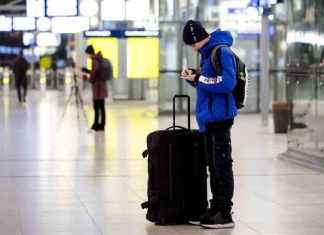The defense attorneys claimed that the officers weren’t sufficiently trained or were inexperienced and didn’t intend to face the charges.
Tou Thao, Thomas Lane, and J. Alexander Kueng are accused of depriving Floyd his right to medical treatment when Officer Derek Chauvin pressed down on Floyd’s neck for 9 minutes. The 46-year old Black man pleaded for oxygen before he stopped. Kueng and Thao were also charged with not intervening to stop Chauvin in the May 25, 2020 killing. This triggered protests around the world and a reexamination on racism and police work.
During the trial, the prosecution sought to prove that Floyd was not rolled onto his side and that he wasn’t given CPR. The defense argued that the Minneapolis Police Department’s training wasn’t adequate and that the officers resorted to Chauvin, the senior officer on the scene.
Thao sat by traffic and other people as Floyd was being held down by the other officers. Kueng placed Floyd on his back, while Lane held onto his legs. All three officers gave evidence.
Manda Sertich , the prosecutor, singled out each ex-officer during her closing argument.
Sertich stated that Thao looked directly at Chauvin, and ignored the pleas of bystanders to help a man dying “right in front of their eyes.”
Kueng picked gravel from the tire of a police SUV as Chauvin mocked George Floyd’s pleas, saying that it took a hell of a lot oxygen to continue talking.
Lane expressed concerns that Floyd was in distress, but did not “give Mr. Floyd the medical help he so desperately needed,” according to the prosecution.
However, Lane and Kueng’s attorneys, both rookies in the field, asked jurors to ask why they were charged.
Earl Gray, Lane’s attorney, stated that his client was concerned about Floyd. He suggested rolling Floyd on his back so he could breath, but Chauvin rebuffed him twice. Lane attempted to revive Floyd when the ambulance arrived. He told jurors that any reasonable person should be dismayed and should be furious that Lane was being charged.
Thomas Plunkett Kueng’s lawyer stated that police were not adequately trained to intervene in an emergency and that Chauvin was responsible. He said that Kueng also looked up to Chauvin as a former field training officer and “relied upon this person’s experiences.”
Plunkett stated, “I’m certainly not saying he wasn’t trained.” Plunkett said, “I’m saying that the training was insufficient to help him perceive, understand and see what was going on here.”
He instructed jurors to apply the law to the facts and be “the exact opposite to a mob.”
After receiving a call from Lane and Thao that Floyd had used a fake $20 bill in a corner shop, Chauvin and Thao went to the scene and helped Lane and Lane. Floyd fought with officers when they tried to get him into a police vehicle.
Robert Paule, Thao’s lawyer, stated that his client believed the officers were doing what was best for Floyd — keeping him there until paramedics arrived.
The charges also include the language that Floyd was “willfully” denied his constitutional rights by officers. Paule stated that jurors will need to find officers “acted with a bad purpose, or an improper motive to disobey/ignore the law.”
He said Thao had increased the urgency of an ambulance emergency call for Floyd. He said it was clear that Thao believed Floyd was using drugs and that he needed to be restrained until help arrived.
Sertich stated that on the intervention charge, the prosecution only had to prove that officers knew that Chauvin was using an unreasonable force and that they had a duty not to use it. She said that Floyd was denied medical treatment because the officers knew Floyd was suffering and did nothing to help him.
She pointed out the 2 1/2 “precious moments” that Floyd was unresponsive to before paramedics arrived.
She said, “They chose not to do anything and it resulted in Mr. Floyd’s suicide.”
Sertich contrasted officers’ inaction to the desperate cries from bystanders, pleading with them for Floyd and to check for their pulse. “Even though the officers had no power, authority, or obligation, they knew that they had to do something.”
Sertich stated that those bystanders gave Thao’s and Kueng “playbyplay commentary” that should have made them aware that Floyd was in trouble. They shouted that Floyd couldn’t breathe, that he wasn’t responsive, and urged the officers to take a closer look at him.
After the judge’s instructions, jurors are expected to start deliberations Wednesday.
U.S. District Judge Paul Magnuson chose 18 jurors to begin the trial, with six alternates. There are still 14 remaining: 12 will be deliberating and two alternates. After a jury that appears all white was dismissed Tuesday morning, a juror of Asian descent was also dismissed. The court didn’t release demographic information.
In December, Chauvin pleaded guilty in the federal case. This was months after he had been convicted of manslaughter and state murder.
Lane, who’s white, Kueng who is Black and Thao who is Hmong American face separate trials in June on state charges that they aid and abet murder and manslaughter.
Just as another major civil right trial in Georgia was ending, the trial saw the conviction of three white men for hate crimes in the death Ahmaud arbery, a 25 year-old Black man who was pursued and shot in February 2020.
___
This story has been updated to correct Floyd’s age at his death. He was 46 years old, not 45.








